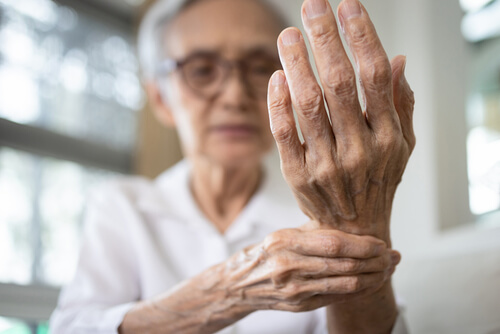
Page contents
Nearly two-thirds of people aged over 65 suffer from arthritis. It
Managing treatment to reduce the pain of arthritis can be done through medication, lifestyle changes, exercise and even surgery.
If you don’t treat arthritis, everyday life and the ability to perform daily tasks can become increasingly difficult.
What is arthritis?
Arthritis is a common joint condition that causes pain and inflammation, limiting movement. Over half of people over sixty-five suffer from the condition. Physiotherapy and physical activity can have a positive impact on joint stiffness.
The condition affects people long-term around all parts of the body and typically takes place in the hands, lower back, neck, knees, hips and feet.
The exact reasons are unknown but weakened cartilage function does appear in the ageing process which enhances the symptoms. Located where two bones meet, the severity can differ between varying joints and the connective tissue breaks down gradually.
Arthritis is common in older people due to reduced stem cell capacity, decreased repair mechanisms and muscle decrease.
Osteoarthritis and rheumatoid are the most common types of arthritis. Osteoarthritis roughens the cartilage lining of the joint and makes the tendons and ligaments work harder. Rheumatoid arthritis occurs when the immune system attacks the affected joints, causing swelling and pain.
Other types of arthritis and related conditions include: ankylosing spondylitis, cervical spondylitis, fibromyalgia, lupus, gout, psoriatic arthritis, enteropathic arthritis, reactive arthritis, secondary arthritis and polymyalgia rheumatica.
What are the signs and symptoms of arthritis?
There are different types, so ensure you receive a diagnosis if you experience any of the following:
- Joint tenderness, pain and stiffness
- Inflammation surrounding the joints
- Limited movement
- Reduction of muscle mass and general weakness
- Red skin over the painful joint
Visit your doctor to gain a specific diagnosis.
Which age group does it affect?
Arthritis can occur as a result of injury at any age but most commonly develops in people middle aged and above – women being three times more likely to experience it. Altering controllable lifestyle and risk factors can minimize the risk of developing the joint condition.
Keele University has seen inflammatory arthritis rise by 40 per cent between 2004 to 2020.
Is there a cure for arthritis?
Currently there is no cure for arthritis. It is a prolonged condition where the strength of someone’s joints deteriorate over time. However advances in treatments do mean that the pain from the condition can be vastly reduced.
Treating arthritis
Arthritis is an irreversible condition but there are treatments to reduce the pain.
Osteoarthritis involves lifestyle changes, medicines and surgery. Occasionally, the condition can improve.
Rheumatoid arthritis treatment slows down joint inflammation.
Osteoarthritis treatment:
- Treatments include simple, manageable lifestyle changes and measures as shown by the NHS:
- Exercising and rehabilitation can improve muscle mass, bone strength and range of motion.
- Loss of weight by maintaining a balanced diet as being overweight can cause extra strain on the joints.
- Consider comfortable footwear and insoles to decrease strain and improve joint pain.
- Use technology and medicines to reduce strain. Consider speaking to your doctor to understand the risks and benefits of some treatments.
Your local GP can prescribe painkillers after giving advice, if major symptoms occur. It is rare that surgery is recommended.
Rheumatoid arthritis treatment
- Doctors use injected biological treatments to prevent specific particles from attacking the immune system and the joints. For example, adalimumab, etanercept and infliximab. However, side effects may include: skin reactions, infections, feeling ill, rise of temperature and headaches. Therefore, begin with the weakest effective treatment to control symptoms.
- The most common treatment comes in the form of disease-modifying anti-rheumatic drugs (DMARDs). These are tablets which blocks attacking chemicals of the joints in the immune system. For example, methotrexate and sulfasalazine. However there are side effects to this treatment: feeling ill, loss of weight and appetite, painful mouth, diarrhoea, headaches and loss of hair.
- Pain relief medicines include painkillers, non-steroidal anti-inflammatory drugs and steroids. Seek advice from a doctor as the strength can vary.
In severe cases surgery can be used.
Consider using the BMI (body mass index) provided by the NHS to calculate if your weight is healthy.
Psychological effects
Arthritis Foundation conducted research which has shown arthritis increases the possibility of anxiety and depression between two and ten times more compared to the general population. So managing treatment can become increasingly difficult and can lead to various other health conditions.
Pain provokes a lowered sense of mood causing physical and emotional stress and exhaustion and fatigue can enhance depression.
Can arthritis cause other health conditions?
Specifically, rheumatoid arthritis provokes further complications and inflammation of the immune system, lungs, heart, eyes and adds an increased risk of heart attacks, strokes and diabetes. This is because the immune system is damaging rather than fighting infection.
It is evident the ageing process weakens the immune system due to it becoming harder to recognise unwanted particles in the body, therefore, older people are more likely to develop other problematic health conditions.
Osteoarthritis can cause risk to the heart, according to Arthritis Foundation. Research has shown people suffering from the condition are three times more likely to develop cardiovascular disease or heart failure. This is due to a growing trend of inflammation caused by the condition.
Helplines
Versus Arthritis
Website: https://www.versusarthritis.org/in-your-area/
Helpline: 0800 5200 520
Email: helpline@versusarthritis.org
Arthritis Action
Website: https://www.arthritisaction.org.uk/
Helpline: 020 3781 7120
Email: info@arthritisaction.org.uk
Age UK
Website: https://www.ageuk.org.uk/
Helpline: 0800 678 1602
Email: info@ageuk.org.uk